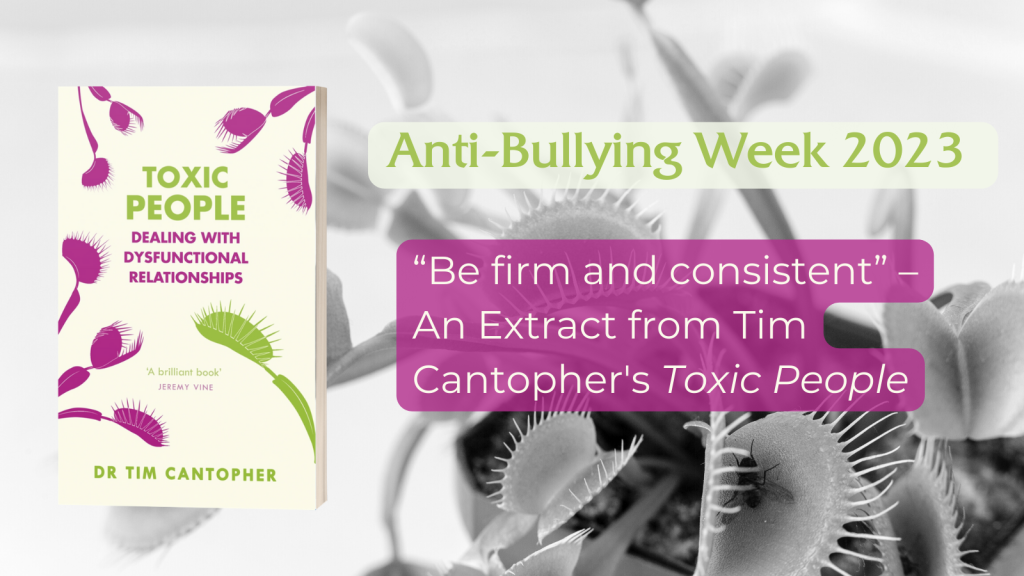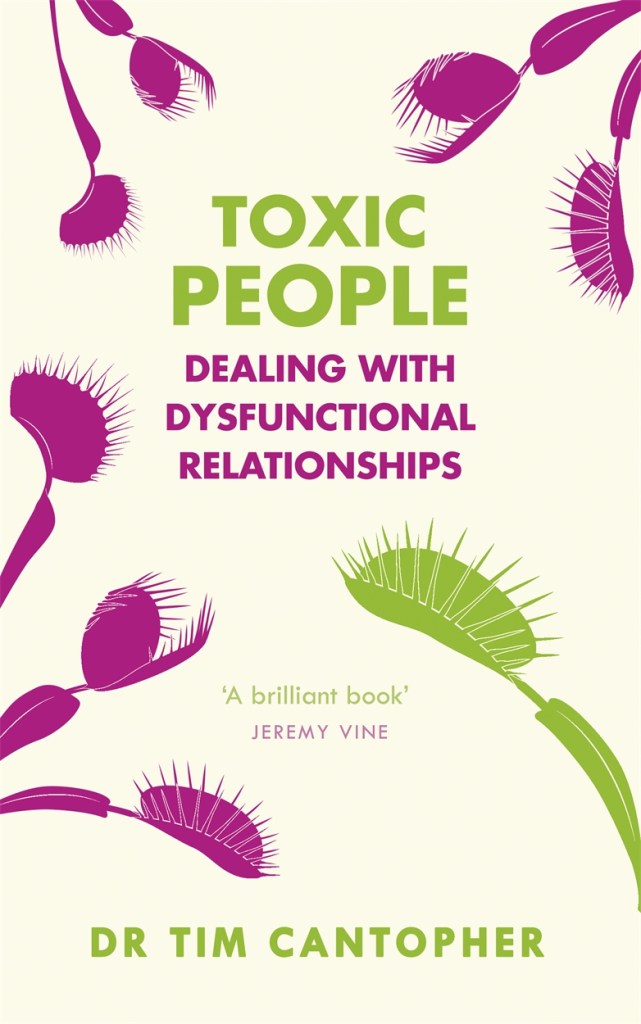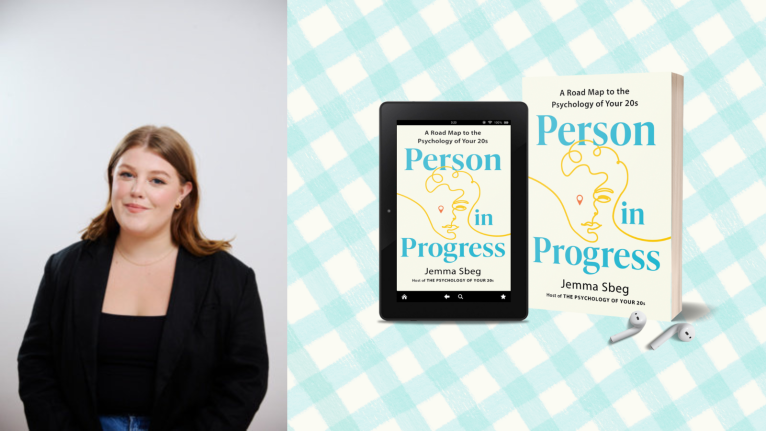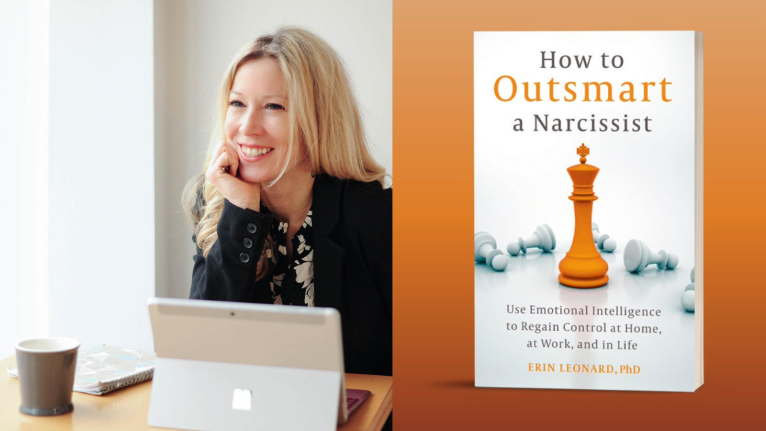Anti-Bullying Week: “Be firm and consistent” – An Extract from Tim Cantopher’s Toxic People

In aid of Anti-Bullying Week, we’re sharing an extract on bullying and sadism from Tim Cantopher’s Toxic People: Dealing with Dysfunctional Relationships, which examines the fictional story of Clive.
Bullies and sadists
Clive is a bully. There is really nothing you can do with him, unless you thrive on conflict yourself. As it says in the poem ‘Desiderata’: ‘Avoid aggressive persons, they are vexatious to the spirit’. Clive uses aggression to get his way and he’s very good at it, having behaved this way all his life. As a kid his family operated on the principle that cruelty is good, so long as you win. The strongest gets the prize and the rest are losers. There really isn’t anything else to Clive; it’s all about intimidating those around him in order to dominate them and force them to do what he wants. You can’t argue, rationalize or negotiate with him because he isn’t motivated by truth, sense or fairness. It’s no use appealing to his better nature as he doesn’t have one. He won’t take no for an answer, so acqui-esce, withdraw or dig in for battle; it’s going to be long and tough.
If you try to stand up to Clive he’ll raise the stakes until you give in; he’ll always get his way, or there’ll be hell to pay. He may intimidate you with violence or the threat of it, but more often his weapon will be humiliation. He may have a group of hangers-on which he needs so that your humiliation is public. And they need him as he makes them feel strong, part of the alpha group, so it’s a symbiotic relationship. He keeps his acolytes in check the same way he does you.
Alternatively, Clive’s bullying may take place behind closed doors, with you the only victim. To everyone else and in public he’s kind and attentive, the perfect parent, spouse, partner or friend. If he is violent to you and you threaten to leave him, he will be apolo-getic for a while and promise you that he will change. It won’t last though, because his frustration and need to subjugate will eventu-ally become overwhelming. Aggression is who he is.
Let’s be clear here: violence and intimidation aren’t normal, whatever Clive says. Loving people don’t hit, intimidate, humiliate or bully their partners. Not even on a bad day, not even when drunk, not even once.
Clive the sadist is particularly scary. He has all of the character-istics of a bully, but in addition he enjoys your suffering. He really gets off on the distress of others, being primarily motivated by inflicting pain and humiliation. He relishes hurting you in any way that he can, whenever the opportunity arises.
While some sadists are criminal, like the sexual sadists who popu-late crime novels, most are more subtle. Clive may have fantasies of sadistic sexual practices, but he won’t act on them, as he wouldn’t like the consequences of getting caught. Instead he uses everyday situations, words, humour, judgements and power to cause you the discomfort and humiliation he so loves to witness. He is charming, but only until he has caught you in his web, when he will abruptly change into a monster. If he has bought you expensive meals or jewellery, such gestures will be short-lived. Soon enough he will start criticizing and humiliating you in public and revealing all of those intimate secrets you confided in him when he seemed to be your friend. When you try to get away, the gifts and apparent generosity he bestowed on you early in your relationship will be thrown at you, making it clear that you’re in Clive’s debt and won’t be allowed to leave until you pay what you owe. If you do leave, he will go to extraordinary lengths to try to reel you back in. The old charm, kindness and generosity will return. But don’t be deceived. If Clive has taken pleasure in hurting you before, he’ll do so again once he’s got you back in range.
[The following paragraphs are from a later, follow-up passage in the book]
There really isn’t much you can do with a bully or a sadist, as they will be better at bullying than you are at resisting unless you are a very confident and assertive person. If you have real evidence from your experience that Clive is a bully or a sadist, get away from him. I don’t mean you need to abandon a relationship if your friend or partner is having an off day and snaps at you once. But if Clive repeatedly hurts or humiliates you, he’ll keep doing so. When you say you’re going to leave he’ll try to reel you back in with promises that he’ll change, but he won’t, not for long, unless he does something real to achieve this change, such as getting into therapy.
If you move out, don’t go back until you feel comfortable to do so, and until you’re really confident that Clive’s change is real and permanent. Clive will tell you that he can’t get by or make progress in treatment without you, but once more this is him trying to regain control, to reel you back in. Be firm and consistent. If you don’t believe that Clive is really changing, don’t be rushed, and if necessary don’t go back. He will try to persuade you that nobody else will have you, that you need him. No you don’t. It’s better to be alone than to be a victim. There are a lot of kind and loving people out there, though Clive will try to persuade you that there aren’t. Bullying isn’t the norm and it isn’t right, whatever Clive says.

Tim Cantopher’s Toxic People: Dealing with Dysfunctional Relationships is available now. If you’re surrounded by the takers of this world, read this book and gain the freedom to make your own choices and live your own life.






